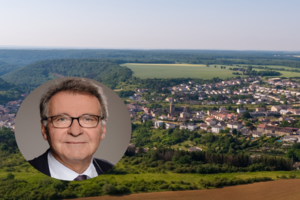News
For Pierre Cuny, there has been "a real awareness of the cross-border phenomenon over the last five years"
February 2024
Mobility, public services, health, housing... how can we respond to the cross-border phenomenon between France and Luxembourg? The mayor of Thionville, chairman of the Pôle métropolitain frontalier (PMF), explains what solidarity measures need to be put in place in his area, where 70% of the 120,000 French cross-border workers in Luxembourg are concentrated. READ MORE
You are now the only local player invited to the Franco-Luxembourgish Intergovernmental Commission (IGC). What role do you play?
70% of the 120,000 French cross-border workers in Luxembourg live in the Border Region Metropolitan Pole (PMF) area. This is therefore where the impact of the cross-border phenomenon is felt most strongly, with effects on mobility, public services, health, housing, etc., which affect the whole population, whether they live on the border or not. The PMF is able to collect, aggregate and structure the problems associated with the cross-border phenomenon and to propose appropriate solutions. The Border Region Metropolitan Pole thus represents the local cross-border level in the IGC. It represents the voice of the territories in the Franco-Luxembourg inter-state relationship and ensures that issues considered to be priorities on the ground, on the 1st and 2nd lines of the border, are placed on the Conference agenda.
Do you feel that attitudes to cross-border solidarity are changing in France and Luxembourg? What can be said about the situation of cross-border commuters on your border today?
The intensity of the growth in cross-border work is going beyond the highest forecasts, and cross-border commuters, like the whole population, are feeling the effects on a daily basis. The most pressing problem is mobility, with journey times between home and work constantly increasing and the entire network becoming congested. Over the last 5 years, there has been a real realisation that Luxembourg cannot be happy with its development if its French neighbour is suffering. Discussions between states are now focusing on co-development and how solidarity can be implemented in practical terms. Innovative proposals will be put forward for discussion. This is a positive development. We now need to define the methods that are best suited to our territory and its particular situation.
You are involved in two pilot projects: one on governance with the European Commission and the OECD, the other on living areas with the MOT. What are you expecting from them?
The structuring of cross-border cooperation on the Franco-Luxembourg border is fairly recent, compared to other borders. But the intensity of the cross-border phenomenon requires territories to find a form of coordination to deal with it as effectively as possible. The 2 pilot projects in which the PMF is involved should provide us with guidelines for defining a strategy for the harmonious development of the Luxembourg metropolis that extends beyond the borders of the Grand Duchy. We also expect proposals on governance and an inventory of the links and their intensity that make our area a cross-border living area.

